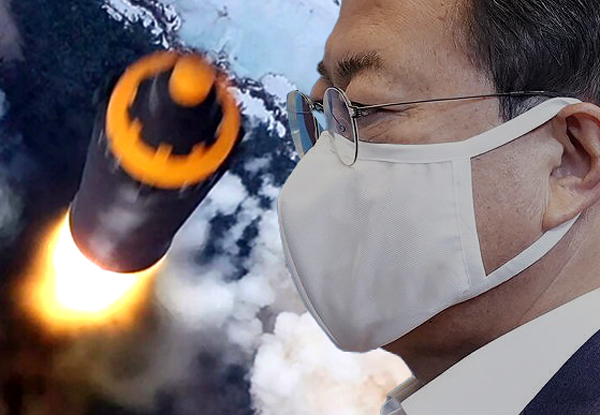President Moon still appears hoping to restart diplomacy
After North Korea tested a missile that can reach the U.S. territory of Guam for the first time since 2017 on Sunday, United Nations Secretary-General Antonio Guterres on Tuesday called it a violation of its self-imposed “moratorium” on long-range missile launches.
South Korean President Moon Jae-in slightly changed his tone from keeping silent on the repeated missile launches by North Korea to condemning them. However, it appears that he is not able to let go of his peace initiative, saying Pyongyang almost broke the moratorium but not just yet.
Guterres released a statement through his spokesman that called the test a clear violation of Security Council resolutions.
“The Secretary-General condemns the launch of a ballistic missile of possible intermediate-range by the Democratic People’s Republic of Korea (DPRK) on 30 January,” the statement read. “This is a breaking of the DPRK’s announced moratorium in 2018 on launches of this nature, and a clear violation of Security Council resolutions. It is of great concern that the DPRK has again disregarded any consideration for international flight or maritime safety. The Secretary-General urges the DPRK to desist from taking any further counter-productive actions and calls for all parties to seek a peaceful diplomatic solution.”
On Sunday, South Korea’s National Security Council (NSC), which convened a rare emergency meeting presided over by President Moon Jae-in, said that the test appeared to involve an intermediate-range ballistic missile (IRBM). North Korea has not tested this missile since 2017. This was the first time in a year that Moon presided over the meeting himself.
“The launch takes North Korea a step closer to fully scrapping a self-imposed moratorium” on testing its longest-range intercontinental ballistic missiles (ICBMs), Moon said. He added that the latest test by North Korea challenges the international community’s efforts to denuclearize the Korean Peninsula, stabilize the peninsula, and solve the problem diplomatically. He also said that it can be viewed as violating UN Security Council resolutions.
This is still a big change in the Moon administration’s stance. It previously had been repeating “concern” and “regret” whenever North Korea launches a missile.
On Monday, the U.S. Department of State announced that it is considering new ways to hold North Korea accountable. Many observers predict that the United States might impose further sanctions against Pyongyang.
“Even as we seek to find ways to address this challenge diplomatically we’re moving forward with different steps to hold the DPRK responsible and accountable,” said Ned Price, spokesperson for the State Department, during a press briefing. “And this month alone we imposed sanctions on 8 DPRK-linked individuals and entities, these are individuals and entities that supported the DPRK’s weapons of mass destruction and ballistic missile-related programs. We are continuing to discuss this challenge in the UN as well.”
In response, North Korea’s Ministry of Foreign Affairs released a statement on Wednesday that blamed the United States for heightened tension on the Korean Peninsula.
“It is a universal knowledge that the failure of the situation on the Korean Peninsula to easily be out of the whirlwind of aggravated tension just lies in the U.S. hostile policy towards the DPRK,” the statement read. “In recent years alone, the U.S. conducted hundreds of joint war drills which it committed itself to halt and also brought ultra-modern means of attack and nuclear strategic weapons into South Korea and the vicinity of the Korean peninsula, posing a grave threat to the security of our state.
The U.S. would be well-advised to halt its military threat to our country and withdraw, before anything else, its hostile policy towards the DPRK rather than publicizing the so-called ‘diplomatic solution’ and ‘dialogue.’”
Meanwhile, Bernard Champoux, a retired three-star general who served as commander of the 8th Army in South Korea during the Obama administration, appeared at a virtual conference held by the Washington Times Foundation on Tuesday and warned of premature discussion of the withdrawal of U.S. forces stationed in Korea.
“In my humble opinion, the perfect time to start considering the withdrawal of U.S. forces from the Korean Peninsula is after reunification, and not a minute before,” he said. “The threat is not only North Korean ICBMs, but also the presence and closeness with a very large army. It’s conventional weapons staring into Seoul’s backyard.”
General Champoux explained that there is a big difference between having U.S. forces physically stationed on the peninsula and maintaining the alliance remotely.
“The Alliance particularly, with the full array of U.S. capabilities, in my estimation, could not respond in time to crisis without the U.S. forces presence on the Korean peninsula,” he said. “Seoul’s vulnerability to the myriad DPRK weapons validates this imperative.”



